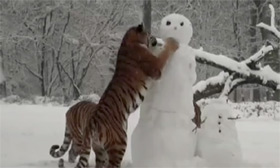There are those who argue that their hatred of America is caused by American actions - as a Cairo professor put it: "It's the policies, stupid!" This way of thinking puts support of Israel at the top of a list of actions that ends with almost everything George Bush has said or done. But Bush, to me, is an enabler of anti-Americanism, not a creator.
This creed is not reactive, it is visceral. Why else would English friends with impeccable anti-racist credentials ask about our children (who grew up in the US) "How will you get rid of their accents." Well, why would we want to?
It is a historical fact that anti-Americanism predates the US. It was not invented in reaction to the Monroe Doctrine or the use of marines to pacify Latin America or McDonald's or Hollywood or Bush. It was invented by European biologists who wrote of the New World, shortly after it had been discovered, that nothing good could come of it. It was ghastly. It stank. One cultured scientist, the Dutchman Cornelius de Pauw, put it thus: "Everything found there is degenerate or monstrous." A lot has happened since then, but some people have not noticed, or do not want to.
The French writer Bernard Henri Lévy points out that the impetus for much of the European disdain for the US came from the right; from "a fascist tendency in French thought based on fear and hatred of democracy". Part of that hatred lives on in our friends' question about our children's accents: it is a deeply held belief among Europeans that US democracy leads to a coarsening of culture. They think our children sound crass. It does not matter how many Nobel laureates live in the US, or how many novelists or musicians; in the end, the taste America leaves in the mouth is of hamburger, not foie gras.
John Bolton looks to me like a hamburger man. The least diplomatic of any recent American diplomat, Bolton, lately of the UN, is the living embodiment of what anti-Americans mean when they say "It's the policies, stupid!". When Bolton growls that "the legitimacy of the US comes from ourselves, we do not require any external validation", you can feel the anti-Americans of the world unite and punch the air with delight; they have their cause and, lo, it is reasonable.
So Hubert Védrine, the former French foreign minister, tells me with a sigh that "the Americans are a colonising people with a mission to convert the world". They have forgotten the lessons of history, he says, and it is Europe's job to remind them. I asked John Bolton to comment on this lofty French vision. "Good luck," he chuckled.
It is, of course, perfectly reasonable to disagree with Bolton. It's perverse to argue - as some US commentators have - that anti-Americanism is always illegitimate. After all, plenty of Americans dislike Bolton with the same passion. It is also possible to exaggerate the extent of anti-Americanism. Living in the US for the past five years, I assumed the rest of the world was seething with passionate resentment at the way it's been treated.
But from a battle-scarred member of Egypt's Muslim Brotherhood, just out of prison and expecting to go back any day, we heard only polite disdain. He had no interest in America he said, but he did not have any desire to see it destroyed. Of course there are those who would slaughter all Americans, but our interviews suggest that the US needs to be a little more discriminating when judging who its real enemies are.
The Harvard political scientist Samuel Huntington has written that "America is not a lie, it is a disappointment". In other words, the promise of the place is real, even though the reality of American action is often depressingly flawed. The US is a project in which the world has a stake; we outsiders created it and we ought to nurture it, not tear it down.
· Justin Webb is BBC Radio's chief Washington correspondent; Death to America - Anti-Americanism Examined is on Radio 4 next Monday at 8pm

















Comment from the paper
Ros Coward: Market forces have brought chaos to universities
Timothy Garton Ash: From outside, it's clear why Britain has to stay in Europe
Martin Kettle: Cameron's speech on Europe was not brave yesterday. He was reckless